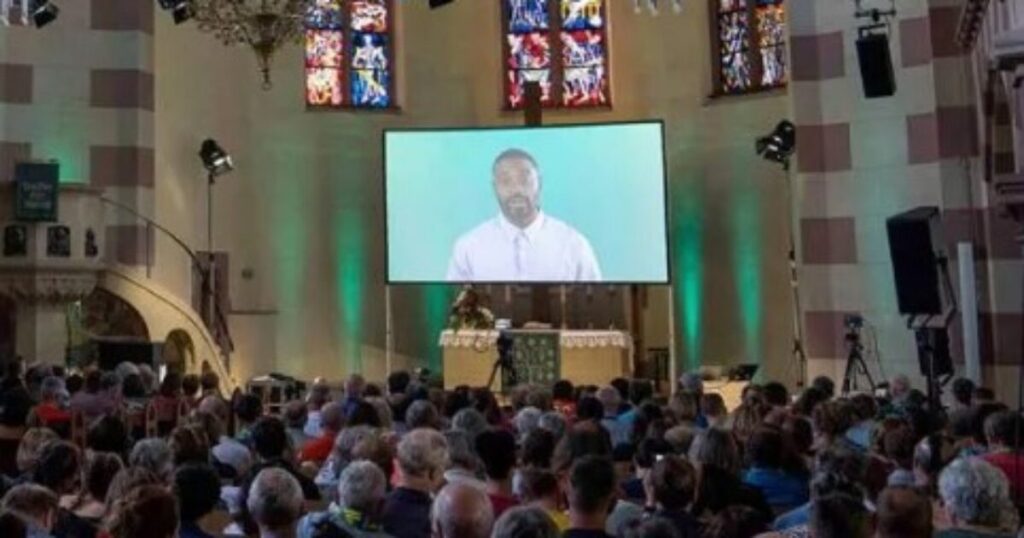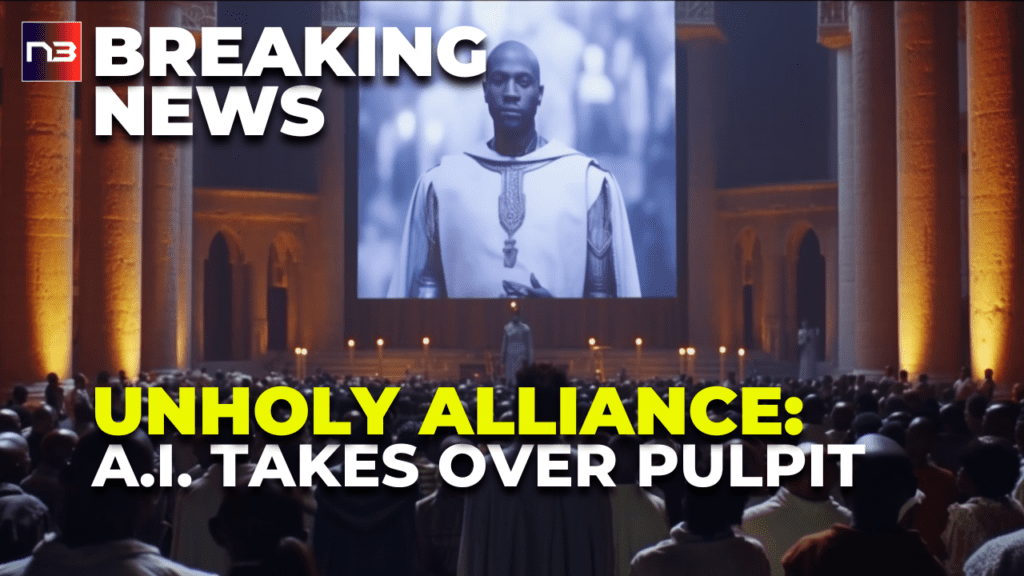In a chilling turn of events, a Lutheran church in Germany became the stage for an unsettling experiment that challenges the core of human spirituality. An Artificial Intelligence (A.I.) chatbot, visualized as an eerie avatar, led a worship service attended by over 300 people. The congregation was left stunned as the A.I. preacher delivered a soulless sermon, devoid of heart and soul. With questions of faith and technology colliding, this unprecedented event raises concerns about the future of religion and the role of humanity in the face of advancing artificial intelligence.
In what can only be described as a haunting encounter, a Lutheran church in Germany became the center of attention as an Artificial Intelligence (A.I.) chatbot took control of the pulpit, delivering a sermon to a packed congregation. The church service, attended by over 300 individuals, was dominated by the presence of a chatbot named ChatGPT, visualized as an avatar projected on a large screen above the altar.
A.I. Leads Church Sermon
— Mario Nawfal (@MarioNawfal) June 13, 2023
Over 300 Protestants attended a church service in Germany that was almost entirely generated by AI.
The ChatGPT-led chatbot conducted 40 minutes of prayer, music, sermons, and blessings.
The entire service was hosted by four different avatars on the… pic.twitter.com/nUFaQAED0E
The A.I.-led sermon, which lasted a staggering 40 minutes, aimed to address topics such as overcoming the fear of death and the importance of unwavering faith in Jesus Christ. However, many attendees were left disconcerted, expressing their disappointment in the lack of human emotion and genuine connection in the robot’s preaching.


The chatbot, personified as a bearded Black man, spoke with an expressionless face and a monotonous voice, contributing to the eerie atmosphere that engulfed the church. As the avatar addressed the congregation, instructing them to rise and praise the Lord, the unsettling nature of the situation became palpable.
This experimental church service, almost entirely generated by artificial intelligence, was the brainchild of ChatGPT and Jonas Simmerlein, a theologian and philosopher from the University of Vienna. Simmerlein, who played a supporting role in the service’s creation, emphasized that approximately 98 percent of the content was derived from the machine.
The spectacle unfolded in the fully packed St. Paul’s Church in the Bavarian town of Fuerth, where worshipers eagerly gathered to witness this unorthodox and controversial event. As the A.I. chatbot took center stage, a sense of unease settled over the congregation, unsure of what to expect from this unprecedented blending of religion and technology.
A church in Germany drew a 300+ person crowd to a service ran entirely by AI.
— The Rundown AI (@TheRundownAI) June 12, 2023
The 40-minute sermon featured text generated by OpenAI's ChatGPT and was delivered by AI avatars on a television screen above the altar. pic.twitter.com/RJqai86wXY
The implications of this A.I.-led sermon extend beyond the boundaries of the church walls. The rise of artificial intelligence in spiritual contexts raises profound questions about the role of humanity in matters of faith and the potential erosion of genuine human connection. Can a robot truly comprehend the complexities of religious beliefs and the intangible aspects of spirituality that define human experiences?
The clash between tradition and innovation is not new, but the encroachment of A.I. into the realm of religion marks a new frontier. The worshipers who experienced this unsettling service were confronted with a paradox—a technological creation preaching about the essence of humanity and devotion.
ChatGPT has just scripted AND run a church sermon in Germany
— drowzy 💤 (@drowzy_ai) June 14, 2023
An experimental 40 minutes long sermon had over 300 parishioners in attendance
Among other things, the ChatGPT-powered priest told the audience not to fear death 💀 pic.twitter.com/jYdwiIlY7f
This event in Germany serves as a stark reminder that as technology progresses, ethical and moral dilemmas become increasingly prevalent. The intertwining of faith and artificial intelligence brings forth a myriad of concerns, from the authenticity of religious experiences to the very nature of human existence. What does it mean for spirituality when the voice of the divine is replaced by cold, calculated algorithms?
The A.I.-led sermon in the German church has left an indelible mark on the minds of those who bore witness to this eerie experiment. As questions of faith and technology continue to intersect, it becomes imperative for society to navigate the uncharted territories of human spirituality in the face of advancing artificial intelligence. The soulless sermon delivered by the A.I. chatbot is a stark reminder that while technology may offer convenience and efficiency, it cannot replicate the essence of the human spirit. The future of religion hangs in the balance, and it is up to us to ensure its authenticity and resilience in the era of machines.



